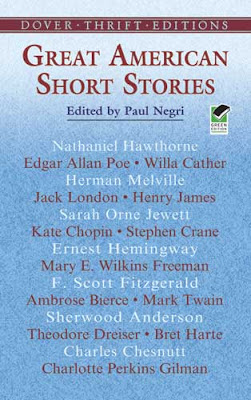As mentioned in an earlier post, part of the rationale of including a decent amount of short stories in the project was to read many different authors. That is true. But there was also the consideration of me purchasing a couple of DTE collections of short stories, because there is something to be said for getting 14-19 stories for $3.50/book. We will start this post, however, with Poe.
Some years back, my brother purchased a two volume collection of the complete works of Edgar Allan Poe. I am not super knowledgeable when it comes to Poe; I've read what most of us get exposed to in grade school and high school. Then I re-read a lot of that this year. Actually, I largely gave up on the Poe book because I didn't like the page layout. I also realized that it would take longer than I wanted to dedicate to one author to get through just the short stories. By the way, it is my limited experience that Poe works better when the poetry and fiction are interspersed.
Having written that, it is more than a little amazing at how trail blazing Poe really was. Yes, he wrought tales of the macbre (whatever that really means) and had some unhealthy obsessions. He was also the (seldom disputed) inventor of the modern detective story, and one of the early writers of science fiction. Shame that he was miserable, and died young and penniless.
From this book, I read "The Unparalleled Adventure of One Hans Pfaall","The Gold-Bug", "The Balloon-Hoax", "Von Kempelen and His Discovery", "The Tell-Tale Heart", "The Cask of Amontillado", and "Shadow–A Parable". The only one that I think really captures Poe at his best is the oft-read "The Cask of Amontillado". I figure to get more read from it this coming year as well, so hopefully I can find some Poe I didn't know that speaks to me.
This is actually a solid collection of horror themed tales. This is where I read my first Bram Stoker – that's right, I've never read Dracula (1897) – and Algernon Blackwood. Rudyard Kipling's "The Mark of the Beast" has a dark menace to it. M.R. James' "Oh, Whistle, and Ill Come to You, My Lad" is haunting in the classic sense. William Hope Hodgson's "The Derelict" has the most AD&D adventure feel I've ever seen in a story (and clearly the borrowing is going the other direction). Blackwood's "The Willows" stands out as the best piece in the book, an uneasy experience of dread of the alien and unknown. Stoker's "Dracula's Guest" was so good that it made me go out and buy a copy of Dracula (I have no idea if I'll read it any time soon, but it is on the shelf). The only downer – for me – was closing the book with the plodding, impersonal style of H.P. Lovecraft (yes, I know that several people worship his writings) in his most published piece, "The Colour Out of Space". Good idea, but written in such a dry, removed manner that I just couldn't care. Also located in this volume is the Poe story "The Facts in the Case of M. Valdemar". It is fine, but not on par with Kipling, Blackwood, or Stoker.
How creepy is Nathaniel Hawthorne's "Young Goodman Brown" (1835)? Devil worshipers in New England (or not), and the fear that people may not be what they seem is enough to ruin a man's soul and goodwill is ambitious, but Hawthorne's style is so good that it all seems – more than plausible – perfectly possible. The rest of the collection is a little less spectacular, but none disappoint. Mary Eleanor Wilkins Freeman's "A New England Nun" (1891) feels like a return of the promise shunned by Goodman Brown (even in solitude); it is an excellent character study. Charlotte Perkins Gilman's "The Yellow Wallpaper" works as either a tale of haunting, a woman going mad, or as a parable for the restraints shackling women to the home. Really, not a bad story in the lot.
This book also has Poe's "The Tell-Tale Heart" and Twain's "The Private History of a Campaign that Failed", which I had read elsewhere. I would say, at $3.50, this is an excellent pick up for those who want a refresher on some of the short stories they read in their school days or as a gift to an adolescent whose primary literary interest may lie in Harry Potter (or the like).
I would kind of like to leave this one off the list. I'm a fan of Richard A. Knaak's Dragonrealm series – probably largely because I met him in 1989 and he autographed the first four books in the series for me – well, most of it (I actively dislike The Horse King). I wish Knaak like his series and characters as much as I do. In the first new Dragonrealm story in over a decade, "Skins", the reader is treated to a horror story forced into a fantasy setting. The main character, Duke Morgis, is changed in a negative way and comes off as less intelligent and more lustful. Just a great disappointment. The rest of the book is great, but maybe Knaak can't go back and write his own world after so much time writing contract genre fiction.





No comments:
Post a Comment